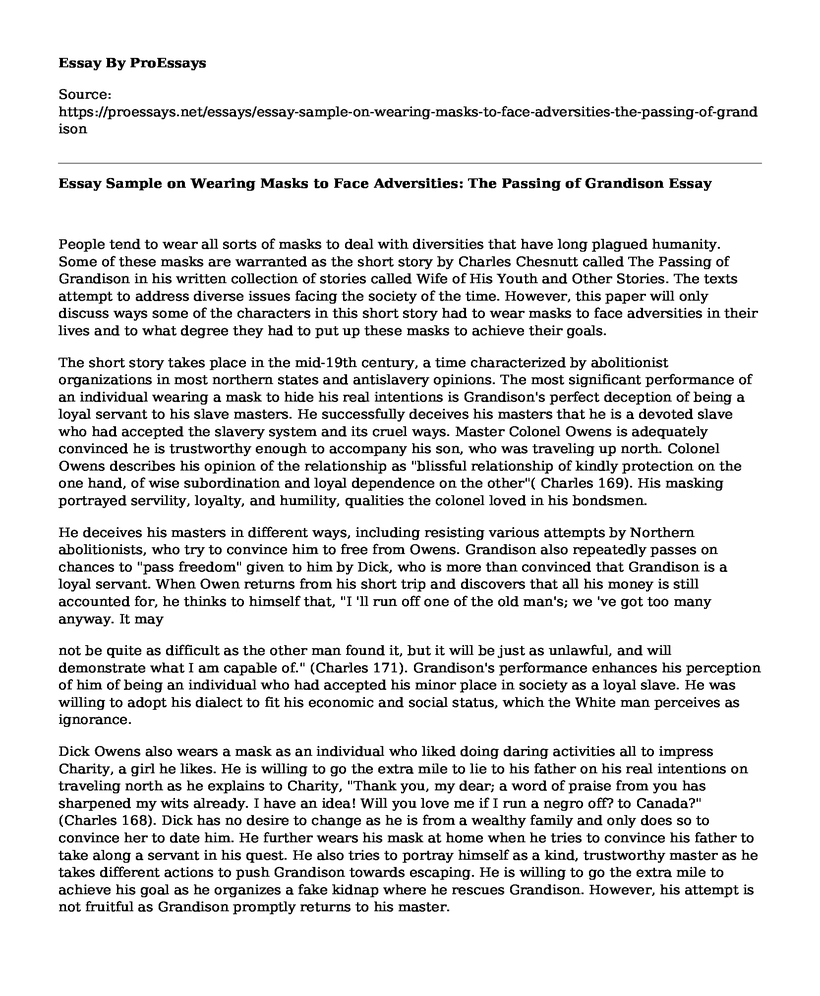People tend to wear all sorts of masks to deal with diversities that have long plagued humanity. Some of these masks are warranted as the short story by Charles Chesnutt called The Passing of Grandison in his written collection of stories called Wife of His Youth and Other Stories. The texts attempt to address diverse issues facing the society of the time. However, this paper will only discuss ways some of the characters in this short story had to wear masks to face adversities in their lives and to what degree they had to put up these masks to achieve their goals.
The short story takes place in the mid-19th century, a time characterized by abolitionist organizations in most northern states and antislavery opinions. The most significant performance of an individual wearing a mask to hide his real intentions is Grandison's perfect deception of being a loyal servant to his slave masters. He successfully deceives his masters that he is a devoted slave who had accepted the slavery system and its cruel ways. Master Colonel Owens is adequately convinced he is trustworthy enough to accompany his son, who was traveling up north. Colonel Owens describes his opinion of the relationship as "blissful relationship of kindly protection on the one hand, of wise subordination and loyal dependence on the other"( Charles 169). His masking portrayed servility, loyalty, and humility, qualities the colonel loved in his bondsmen.
He deceives his masters in different ways, including resisting various attempts by Northern abolitionists, who try to convince him to free from Owens. Grandison also repeatedly passes on chances to "pass freedom" given to him by Dick, who is more than convinced that Grandison is a loyal servant. When Owen returns from his short trip and discovers that all his money is still accounted for, he thinks to himself that, "I 'll run off one of the old man's; we 've got too many anyway. It may
not be quite as difficult as the other man found it, but it will be just as unlawful, and will demonstrate what I am capable of." (Charles 171). Grandison's performance enhances his perception of him of being an individual who had accepted his minor place in society as a loyal slave. He was willing to adopt his dialect to fit his economic and social status, which the White man perceives as ignorance.
Dick Owens also wears a mask as an individual who liked doing daring activities all to impress Charity, a girl he likes. He is willing to go the extra mile to lie to his father on his real intentions on traveling north as he explains to Charity, "Thank you, my dear; a word of praise from you has sharpened my wits already. I have an idea! Will you love me if I run a negro off? to Canada?" (Charles 168). Dick has no desire to change as he is from a wealthy family and only does so to convince her to date him. He further wears his mask at home when he tries to convince his father to take along a servant in his quest. He also tries to portray himself as a kind, trustworthy master as he takes different actions to push Grandison towards escaping. He is willing to go the extra mile to achieve his goal as he organizes a fake kidnap where he rescues Grandison. However, his attempt is not fruitful as Grandison promptly returns to his master.
References
Re Chesnutt, Charles Waddell. "The passing of Grandison." The wife of his youth and other stories of the color line (1899): 168-202. fereces
Cite this page
Essay Sample on Wearing Masks to Face Adversities: The Passing of Grandison. (2023, May 02). Retrieved from https://proessays.net/essays/essay-sample-on-wearing-masks-to-face-adversities-the-passing-of-grandison
If you are the original author of this essay and no longer wish to have it published on the ProEssays website, please click below to request its removal:
- Oroonoko as a Christ Figure - Literary Essay Sample
- Heart of Darkness by Joseph Conrad Essay Example
- On the Death of Dr. Robert Levet Elegy Essay
- Don Quixote Critic's Approach Annotated Bibliography
- Essay Sample on Wonder Woman: Exploring Feminine Intuition Through Visuals & Narrative
- Essay Example on Antigone: A Tale of Clashing Themes and Gender Roles
- Essay Example on Comparing Dahl & Wells: The Landlady & A Dream of Armageddon







